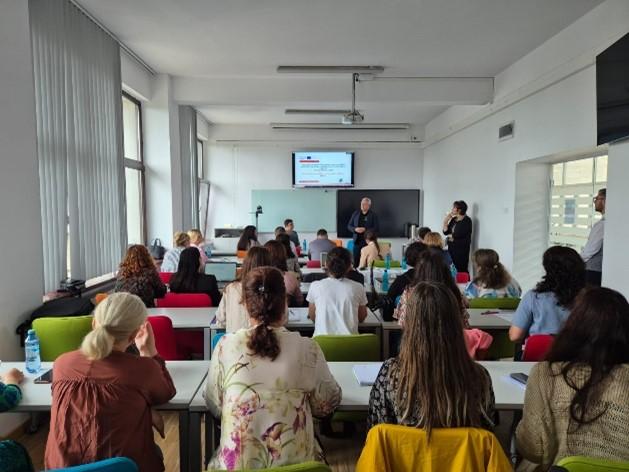Empowering Migrants: Building Sustainable Employment

A dynamic event focused on the labour market for migrants was recently held on 10 September 2024, organised by the Department of Educational Sciences and the Department of Sociology from the Faculty of Sociology and Psychology at West University of Timișoara. This gathering was made possible through the collaboration with the West Regional Development Agency (ADR-West), the Timiș County Prefecture, and the Timiș County Employment Agency (AJOFM Timiș).
The event took place within the framework of the European interregional project SALAM—Sustainable Accessibility on the Labor Market, which is coordinated by the University of Florence.
A total of 36 decision-makers, experts, researchers, and practitioners from various institutions and organizations participated. Representatives from public institutions such as the Timiș County Prefecture, Timișoara City Hall, Timiș County Council, and local agencies like AJOFM Timiș and the West Regional Development Agency were joined by police, social assistance departments, educational resources, and health departments. Participants also included university experts from the Polytechnic University of Timișoara and West University of Timișoara. In addition, several non-governmental organizations with extensive experience in migrant issues contributed, such as the Timișoara Intercultural Institute, Save the Children, UNHCR, AIDROM, and LOGS Social Initiative Group.
The presence of key experts such as Superintendent Raul Ambrus, Vice-Rectors Professor Dr. Valy Geta Ceia and Associate Professor Dr. Mădălin Bunoiu, and AJOFM Executive Director Roxana Kasai, highlighted the significant importance placed on this issue. Their participation, along with institutional directors and heads of services working with migrant populations, further emphasized the urgency of addressing these challenges.
The event was highly productive, fostering a collaborative environment where experts and institutions exchanged best practices and engaged in meaningful discussions. Together, the participants identified key challenges and began developing concrete solutions to enhance the integration of migrants into the labour market. One of the crucial insights was the necessity of supporting efforts with scientific data to properly gauge the scale of the problem, and the university's role in this was emphasized.
Over the next four years, as part of the SALAM project, semi-annual meetings will continue to be organized to monitor the progress of proposed and piloted measures, ensuring they remain responsive and effective in fostering the sustainable inclusion of migrants into the workforce.
